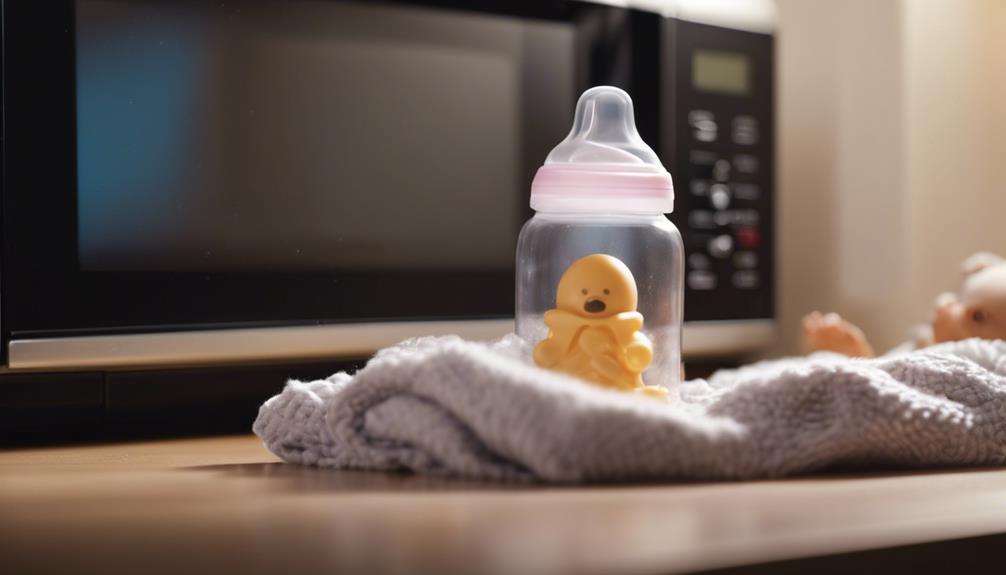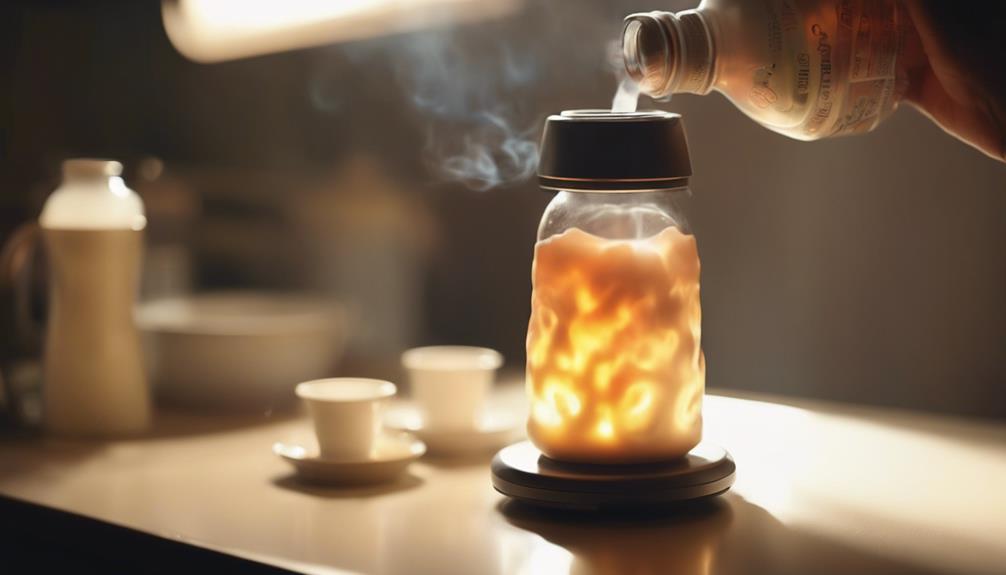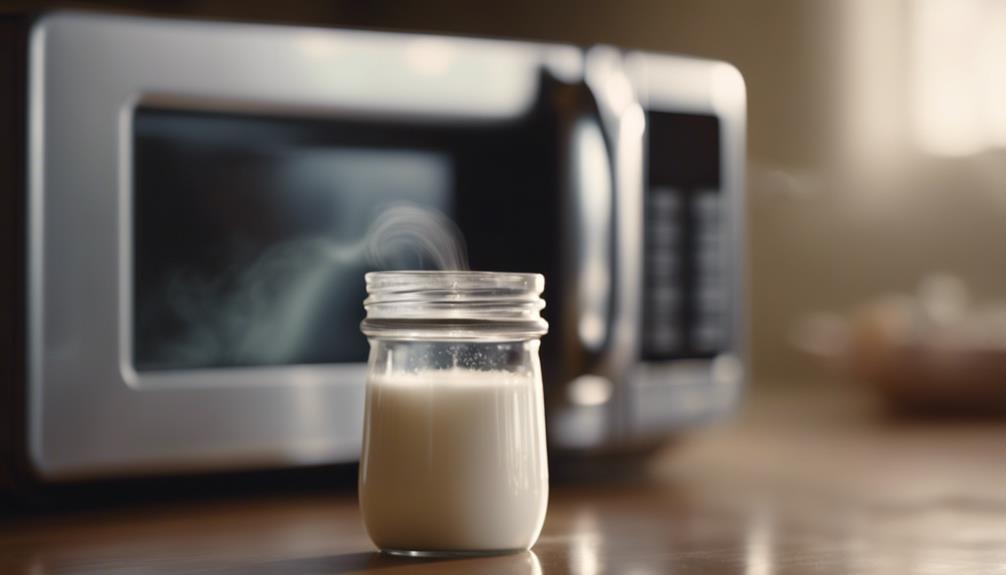Can You Microwave Baby Bottles
No, it is not safe to microwave baby bottles.
Microwaving baby bottles can create hot spots in the liquid, which can burn your baby's mouth and throat. Additionally, microwaving can cause uneven heating, leading to the potential for harmful bacteria to survive in the bottle.
It is best to warm bottles using a bottle warmer or by placing them in a container of warm water.
Always test the temperature of the milk or formula before feeding it to your baby to ensure it is safe.
Key Takeaways
- Microwaving baby bottles is not recommended due to safety risks and nutrient loss.
- Use safer alternatives like warm water or bottle warmers for gentle heating.
- Prioritize testing temperature before feeding to prevent burns.
- Optimal safety and nutrient preservation with alternative warming methods.
Safety Considerations When Microwaving Baby Bottles
When considering the safety of microwaving baby bottles, it is crucial to be aware of the potential risks and hazards associated with this practice. Microwaving bottles can lead to overheating, affecting the vitamins in formula and breast milk, potentially harming the baby's nutrition.
Additionally, the hot temperature of liquid in microwaved bottles can cause burns to the baby's mouth and throat, posing a serious danger. Steam buildup in closed containers during microwaving also presents the risk of explosions, further endangering the baby.
Real incidents have demonstrated that babies can suffer burns from microwaved bottles, highlighting the importance of caution. To mitigate these risks, it is advisable to warm baby bottles using safer methods like placing them in warm water or under a tap.
Potential Risks of Microwaving Baby Bottles
Considering the potential risks associated with microwaving baby bottles, it is essential to understand the dangers posed by this practice to ensure the safety of infants. Microwaving can create hot spots in the liquid, increasing the risk of burning the baby's mouth and throat. Overheating may lead to the loss of essential nutrients in expressed breast milk and formula.
Steam buildup in closed containers poses a risk of explosions, which can cause serious harm. Real incidents have shown that babies can suffer burns from hot liquid in microwaved bottles. Additionally, formula in disposable liners can explode when microwaved, presenting a safety hazard.
These risks highlight the importance of following safe practices when warming baby bottles to prevent potential harm to infants.
Benefits of Microwaving Baby Bottles

Microwaving baby bottles offers a time-saving and convenient method for quickly warming milk or formula. This process can efficiently heat the bottle using microwave ovens, providing warm water for the formula.
Despite some concerns about potential nutrient loss or hot spots, microwaving can help retain the nutritional value and vitamins in the milk. For busy parents or caregivers, this method offers convenience and saves time, making it a practical solution for on-the-go feeding situations.
Additionally, microwaving baby bottles can be particularly beneficial during nighttime feedings, allowing bottles to be warmed swiftly without causing disturbance to the baby's sleep.
Proper Techniques for Microwaving Baby Bottles
Utilizing appropriate warming methods ensures the safe and effective heating of baby bottles for optimal feeding conditions. When it comes to microwaving baby bottles, it's crucial to follow proper techniques to minimize the risks associated with this method. Here are some key points to consider:
- Avoid Microwaving Breast Milk or Formula: Microwaving can cause uneven heating, leading to nutrient loss and potentially damaging essential components in breast milk or formula.
- Testing Temperature: Always test the temperature of the milk by placing a few drops on your wrist before feeding the baby to prevent burns.
- Consider Safer Alternatives: Opt for warming baby bottles in warm water or under a warm tap to ensure a more even and controlled heating process, reducing the risk of hot spots and burns.
Alternatives to Microwaving Baby Bottles

When seeking safer methods for warming baby bottles, utilizing warm water or a warm tap provides a reliable alternative to microwaving. Placing the bottle in warm water or rinsing it under a warm tap allows for gentle and even heating. Remember to shake the bottle gently to distribute the heat evenly.
Always test the temperature of the milk on your wrist before feeding the baby to prevent burns. Following safe warming practices is essential to ensure the baby's safety and to avoid the risks, accidents, and injuries associated with improper bottle-warming methods.
Taking the time to warm bottles safely is crucial in preventing potential harm and ensuring the well-being of the baby.
Best Practices for Warming Baby Bottles
For optimal safety and preservation of nutrients, it is recommended to avoid using the microwave for warming baby bottles. When warming baby bottles, follow these best practices:
- Avoid Microwaving: Opt for safer methods like placing the bottle in warm water or running it under a tap to ensure gentle and even heating.
- Shake the Bottle: After warming, gently shake the bottle to distribute the heat evenly throughout the liquid.
- Test Temperature: Always test the temperature of the formula or breast milk on your wrist before feeding to prevent burns and ensure it is at a safe level for the baby.
Final Thoughts on Microwaving Baby Bottles

Considering the potential risks and nutrient loss associated with microwaving, it is prudent to explore alternative methods for warming baby bottles.
Microwaving baby bottles can create hot spots in the liquid, posing a scalding hazard to infants. Heating breastmilk in a microwave can lead to the loss of essential nutrients and beneficial components, impacting its nutritional value. For instance, breastmilk can lose its nutritional integrity when exposed to temperatures exceeding 104 degrees Fahrenheit. Hot formula or breastmilk with unevenly distributed temperatures from microwaving can harm babies and reduce the milk's quality.
To ensure the safety and nutritional value of the milk, it is recommended to use safer alternatives like a bottle warmer or warm water for warming baby bottles.
Frequently Asked Questions
Can Microwaving Baby Bottles Affect the Quality of Breast Milk or Formula?
Microwaving breast milk or formula can compromise its quality by creating dangerous hot spots, reducing essential nutrients, and harming beneficial components. To preserve nutritional value and ensure infant safety, opt for safer warming methods like warm water or bottle warmers.
Are There Specific Types of Baby Bottles That Should Not Be Microwaved?
Certain types of baby bottles, like glass or those with plastic disposable liners, should not be microwaved due to safety risks. It is crucial to follow guidelines on bottle materials, design, compatibility, and suitable heating methods for infant safety.
How Can I Tell if a Baby Bottle Is Too Hot After Microwaving?
When ensuring a baby bottle's temperature post-microwaving, prioritize safety by testing it on your wrist for ideal warmth. Employ safe handling practices, explore alternative testing methods, utilize cooling techniques, consider bottle materials, practice proper sterilization, and prioritize baby feeding safety for optimal microwave use.
Can Microwaving Baby Bottles Cause Any Changes in the Nutrients of Breast Milk or Formula?
Ensuring nutrient retention in breast milk or formula is vital. Microwave safety is crucial to avoid overheating and nutrient loss. Temperature control, sterilization methods, and bottle material are key factors in preserving breast milk benefits and formula preparation.
Are There Any Specific Guidelines for Microwaving Baby Bottles Based on the Age of the Baby?
When considering microwave safety and bottle temperature for baby feeding, guidelines vary based on the infant's age. Parents should follow heating instructions to ensure safe bottle preparation, consult pediatricians for parenting tips on bottle sterilization, infant care, and baby nutrition while considering alternative heating options.
Conclusion
In conclusion, microwaving baby bottles poses significant risks to the safety and health of infants. Overheating can compromise the nutrients in formula and breast milk, potentially causing burns.
It is essential to prioritize safety measures when warming baby bottles, utilizing alternative methods such as warm water or tap heating. Remember to always test the temperature before feeding the baby to ensure their well-being and avoid any potential hazards.
